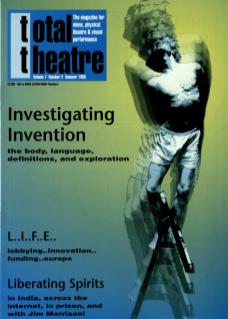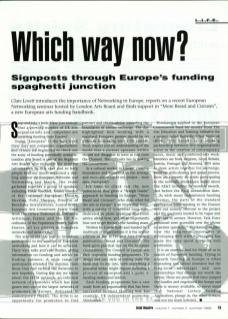Stop and take a look. Have you noticed that a growing number of UK arts organisations and companies are receiving funding from Europe? Going ‘European’ is the buzz word these days and companies, organisations and venues are beginning to check out the array of funding potentially available. London Arts Board is one of the Regional Arts Boards, who recognise the need for information in this area and to help people find out more, organised a day-long seminar on European Networks and Networking last March. The event gathered together a group of speakers including Hilde Teuchies, former director of the Informal European Theatre Meeting, Polly Thomas, Director of Brouhaha International, Louise Scott, European Arts Consultant, Sylvie Viaut from the Office National de Diffusion Artistique, France and the UK Coordinator of the Pepinieres Project, Judith Staines, all key players in European networks and networking.
The aim of the day was to introduce participants to the concept of European networking and how it can be achieved. There were talks and case studies, giving information on funding and advice on finding partners. A wide range of participants attended the seminar, from those that had tackled the networks to new hopefuls. During the day we learnt about the IETM network, an informal network of promoters which has now grown into one of the largest networks of promoters in Europe, dedicated to contemporary theatre. The IETM is an opportunity for promoters to find partners and obtain advice, extending the boundaries of artistic exchange. The day highlighted how working with a mainland European partner should be no different to working with a UK partner. Trust, respect and an understanding of the world that a partner operates within should not disappear as soon as you cross the Channel. The difficulty lies in making the connections.
As a cultural worker in Europe, crossing boundaries and interested in the synergy and transnationality of my project... mon dieu, eurospeak!!
It's time to check out the new publication that gives a ‘Rough Guide’ approach to funding in Europe. More Bread and Circuses, who does what for the arts in Europe is an impressive tome, with a catchy if somewhat long title, dedicated to plain speaking and frank advice about how, and more importantly how not to get through the funding maze.
Written by Louise Scott and funded by a multitude of organisations it is the revised edition of the IETM and Arts Council publication Bread and Circuses. The book gives practical tips on the European Commission, The Council of Europe, and their respective funding programmes. The design and easy style of writing make the book easy to dip into, with everything a potential seeker might require including a glossary of eurospeak and a game of funding snakes and ladders.
Each funding programme has a case study from an organisation that has been successful in their funding bid. For example, UK independent promoter, Shinkansene Shinkansen applied to the European Commission fund for money from The Arts Education and Training initiative for a project called Butterfly Effect Network (BEN). This project is a working partnership between five organisations active in the creation of contemporary dance, music and combined-arts work. Members are from Belgium, Great Britain, Austria, Portugal and Slovenia. BEN aims to draw artists together for exchange, based on skills-sharing and group process; there are currently 40 artists participating in the network. Shinkansen heard about The AE&T Initiative by word of mouth, just before the final submission date. ‘...As with many commission funding schemes, the parts of the standard application form relating to the finance were not entirely relevant to the project and the questions tended to be vague and awkward to answer. However, Task Force personnel were accessible over the phone to answer questions.’ Shinkansen explain how the long-term importance of developing BEN with EC support has made the time spent applying well worthwhile.
It is an essential tool for those of us in search of European funding. Trying to unearth funding in Europe is often frustrating and labour intensive but the long-term advantages and new partnerships that emerge are worth the labour. There are people that have jumped the hurdles and negotiated the hoops and there is money available, so never mind that National Lottery Funding Application, plunge in, the water is warm and not too shark infested...

